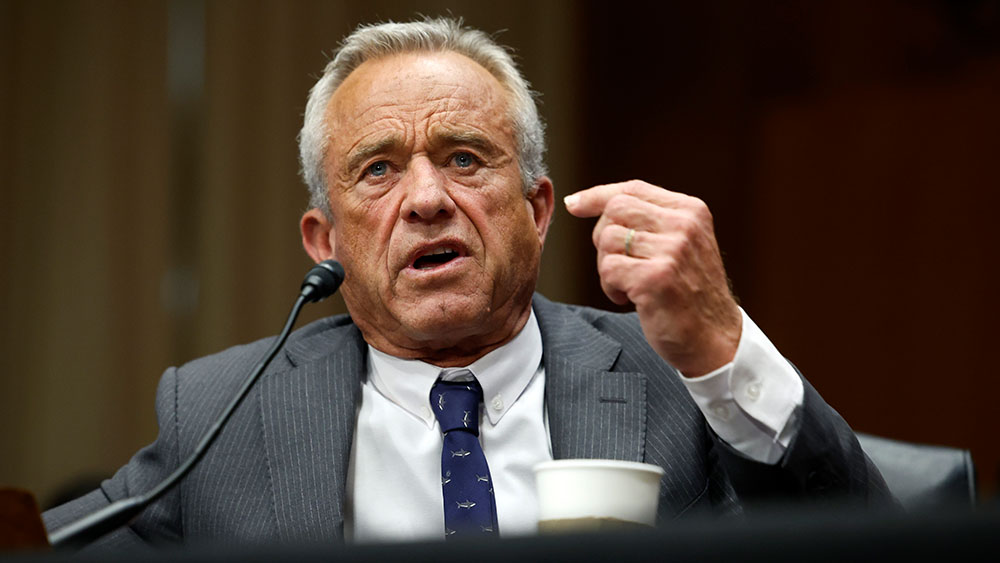RFK Jr. AXES all 17 members of CDC’s vaccine advisory committee, citing panel’s “historical corruption”

RFK Jr. AXES all 17 members of CDC’s vaccine advisory committee, citing panel’s “historical corruption”
- Health Secretary Robert F. Kennedy Jr. dismissed all 17 members of the CDC’s Advisory Committee on Immunization Practices (ACIP), citing systemic corruption and conflicts of interest with pharmaceutical companies.
- Kennedy framed the move as necessary to restore public trust, accusing ACIP of approving vaccines without rigorous placebo-controlled trials, especially for infants and pregnant women. New members will prioritize evidence-based decisions.
- Kennedy challenged claims about placebo-controlled studies, revealing that many vaccines were tested against active comparators (not inert placebos), potentially masking safety risks.
- While critics like Children’s Health Defense praised the purge, mainstream groups (e.g., AAP, IDSA) condemned it, dismissing allegations of bias but not addressing the placebo trial issue.
- ACIP’s recommendations influence billions in vaccine revenue, prompting industry unease. Critics highlighted ties between medical organizations and pharma funding, questioning their objectivity.
Health Secretary Robert F. Kennedy Jr. announced the immediate removal of all 17 members of a Centers for Disease Control and Prevention (CDC) panel in charge of immunization, sending shockwaves through the public health establishment.
The environmental lawyer and vocal advocate for vaccine safety declared the move essential to restoring public trust. He framed the decision as a necessary purge of systemic corruption, as the ACIP’s members have financial ties to Big Pharma.
In a Wall Street Journal op-ed, Kennedy accused ACIP of rubber-stamping vaccines without rigorous safety testing – particularly for infants and pregnant women. Kennedy added that over the coming days, he will appoint new members – physicians and scientists committed to “evidence-based decision-making.” He insisted, however, that none will be “ideological anti-vaxxers.” (Related: RFK Jr.’s sweeping CDC vaccine panel purge: A trust reset or a political minefield?)
The ACIP, responsible for recommending which vaccines are added to the childhood immunization schedule, has long been a lightning rod for controversy. Its influential recommendations have expanded the childhood vaccine schedule from a mere 11 shots in 1986 to as many as 92 today.
Central to Kennedy’s argument is the claim that no routine childhood vaccine on the CDC’s schedule was approved based on placebo-controlled trials, the gold standard for drug safety. Instead, many vaccines were tested against other vaccines or active substances, making it difficult to isolate risks.
The secretary dismantled a recent report from the fake news purveyor CNN claiming 257 placebo-controlled vaccine studies existed. He revealed that most either used non-inert comparators like aluminum adjuvants, or were irrelevant to U.S. licensure.
For example, a mumps vaccine trial (RCT 176) was not used to approve the current MMR shot. In another case, a flu vaccine study (RCT 124) showed higher hospitalization rates in the vaccinated group. “If we don’t test vaccines against true placebos, we can’t know if they cause more harm than they prevent,” Kennedy argued.
Pharma industry, public health sector riled up with ACIP firings
Kennedy’s move to terminate all 17 ACIP members has drawn fierce reactions. Voices from the medical establishment expressed outrage, while vaccine makers nervously watched.
Children’s Health Defense CEO Mary Holland praised the move, denouncing the ACIP as a “rubber stamp” for Big Pharma. Dr. Meryl Nass agreed with Holland’s sentiments. Nass, a critic of vaccine mandates, said the purge was “only a first step” in dismantling systemic bias.
The Infectious Diseases Society of America called the allegations “unfounded,” while the American Academy of Pediatrics (AAP) labeled the firings an “unmitigated public health disaster.” Notably, none addressed Kennedy’s core claim about missing placebo trials.
Also, their criticisms were tainted. Journalist Paul Thacker highlighted the AAP’s reliance on pharmaceutical funding, while lawyer Aaron Siri remarked: “When medical groups protest transparency, ask who pays them.”
Vaccine maker Merck, which awaits an ACIP vote on its respiratory syncytial virus injection, downplayed concerns. But analysts noted that Kennedy’s skepticism has already dampened vaccine stocks.
ACIP’s history reveals deeper flaws, with the committee never rejecting a vaccine since its 1964 creation. Congressional reports describe an opaque appointment process, with members often holding pharmaceutical grants or patents.
Kennedy’s overhaul marks a seismic shift in U.S. public health. “We will protect all children – from disease and from unsafe medicine,” he wrote on X. Now, the nation is watching to see if he can deliver.
CDC.news has more similar stories.
Watch former CDC Director Dr. Robert Redfield describing RFK Jr. as “the most consequential health secretary ever” in this clip.
This video is from the TrendingNews channel on Brighteon.com.
More related stories:
RFK Jr. pushes CDC to drop COVID-19 vaccine recommendation for children, citing lack of benefit.
RFK Jr. takes axe to CDC in historic overhaul of Bill Gates-inspired Epidemic Intelligence Services.
RFK Jr. to lead HHS vaccine investigation under Trump administration.
Sources include:


